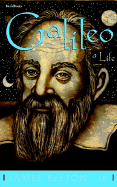|
|
|
|
||||||

|
Galileo: A Life
By James Reston, Jr. 2000/01 - Beard Books 189312262X - Paperback - Reprint - 332 pp. US$19.95
The dramatic story of an era during which science and religion were one and where one man dared to defy the only power on earth that was able to bring him to his knees. Publisher Comments
A suspenseful narrative and spirited rendition of the life of Galileo Galilei, the Renaissance giant who set out on a collision course with the Roman Catholic Church. James Reston's meticulous research, astute use of excerpts from letters, poems, and church documents enliven his hero on every page. From Bruno Maddox - Washington Post Book World
It is to James Reston's credit that his masterful new biography of Galileo Galilei manages to capture... the Renaissance as colorfully as it does, without making his subject seem too much like some time-traveling hero from a more sensible age... a brilliant
biography. From Booklist From Kirkus Reviews , April 1, 1994 This readable biography of the 17th-century scientist and mathematician is long on politics and personality and short on science and math. Reston (Collision at Home plate, 1991) divides Galileo's life in three. Since there is no wealth of information on the developmental years and early career, they are handled quickly. Galileo's rise is given in greater detail, especially his search for patronage, his intense defense of his work in the face of religious and intellectual resistance, and his ridiculing counterattacks on plagiarists and intellectual thieves. Reston assumes we know Galileo's achievements in the sciences and so spends little time on them. Instead, he builds the biography around two aspects of Galileo's character. The first is his political instincts, which on the one hand led to a fawning attitude to secular and ecclesiastical patrons, and on the other to a powerful use of his pen in attacking intellectual opponents without regard to political implications. The second trait Reston focuses on is Galileo's intellectual self-assurance, which kept him from understanding the anti-intellectual resistance to his work. These political implications come back to haunt Galileo, as the third part of the book shows in chronicling the scientist's fall. Reston devotes the major portion of his book to Galileo's trials. He creates a well-rounded portrait, convincing the reader to appreciate Galileo's mood swings, his intellectual arrogance, and his final capitulation as behavior to be expected from the man portrayed. He is as good exploring the politics of Counter- Reformation Italy and the anti-intellectualism of the conservative elements of the Church, and weaker on why and how Galileo's work was potentially heretical. He successfully portrays Galileo's world, with its colorful group of Renaissance Italians. Readily accessible, the book is an interesting character study and political biography of the great scientist. -- Copyright ©1994, Kirkus Associates, LP. All rights reserved.
From Ingram From Owen Gingerich, Harvard University James Reston, Jr. paints a vivid yet sensitive portrait of Galileo: his
effervescent friendships in the rich intellectual milieu of the Venetian
Republic, the brew of excitement and egoistic paranoia that accompanied his
astronomical discoveries with the telescope, the annoyances of a derelict
brother and the lawsuit over his sister's dowry, the agony of the trip to Rome
to face the Inquisition. It is a dramatic story, often told, but never as
compellingly as this A brilliant, masterful biography. From Los Angeles Times Fresh sinewy, and altogether admirable. From William A. Wallace - America Reston does a lot with this. He captures the bad side of the Pope's insistence that Galileo refrain from describing the surface of the moon as anything other than perfectly smooth, shiny, and sinless. Because of course Adam and Eve had not sinned up there. Like Galileo, Reston also catalogues some of the surface imperfections of his subject, and what they suggest about his mindset and his world. The family portrait of Galileo's two daughters, both shunted off to a convent, is tragic, and Reston penetrates this sub-unit of his topic convincingly, getting into how one daughter became pious, while another become embittered. The idea of using the Church for refuge for your daughters is intersting, since the same Church was leaning on Galileo. This book is a great tour of the man behind the discoveries, the math equations and the historic controversies. The feel of the Italian city states of the Renaissance also comes out in this book, and it's no coincidence that the family and clan-based capitalism of Galileo's patrons had to precede or lay the groundwork for someone of Galileo's talents to really produce something. This book is hard to put down. Good to take on a vacation. From Paul Perdue (psperdue@aol.com) from Augusta, Georgia, U.S. (Amazon.Com) In what could be considered an early case study and fore-runner to the famous Scopes monkey trial in the United States, the story about Galileo's life and unfortunate clash with the Catholic Church is a tale of humanity that unfortunately, never seems to die. James Reston has been able to accurately portray the dangerously volatile environment which often germinates when science and religion collide with each other, and he has done so within the framework of a life that was pure genius. It is not often easy to step back and to objectively juxtapose a beautiful life with the darkness of injustice and religious intolerance. James Reston's book has been able to accomplish just such a feat.
|
|
|
|
home
| about us
| contact us
| related
sites |